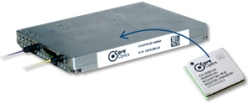Mar 24 2010
CoreOptics Inc. has launched its coherent detection technology-enabled 40G transponder module. CoreOptics, a leading designer and maker of 10/40/100 Gb/s optical systems, has leveraged its expertise in large capacity optical transponder systems, which are distortion tolerant, to develop the high-performance 300-pin low-cost MSA compliant transponder for the future of optical networks.
 Distortion-Tolerant MSA Transponders from CoreOptics
Distortion-Tolerant MSA Transponders from CoreOptics
The module facilitates the minimum level network expense for existing 40G systems in the current market by using free transmission of Dispersion Compensation Module (DCM) along 2000 km of single mode fiber.
The main features of the platform are supported by the Coherent Detection Digital Signal Processing (DSP) technology developed by CoreOptics. The technology provides significantly enhanced performance in lessening the effect of PMD and CD impairment in comparison to existing modulation schemes that incorporate DQPSK or DPSK.
Dr. Bernd Schumacher, Nokia Siemens Networks’ optical networks business unit head, said that he is pleased to collaborate with CoreOptics for introducing this disruptive technology in the market for global deployment of networks of service providers. Schumacher revealed that Nokia’s SurPass hiT 7300 Transport platform design was able to cater for capacity and distance requirements of service providers, and also enable an infrastructure that is flexible, transparent, and dynamic. Schumacher explained that Nokia has reduced drastically the overall investment expense related to creating and operating customers’ transport networks.
Hamid Arabzadeh, CoreOptics’ CEO, President, and Board Chairman, adds that networks of service providers require rapid scaling for staying afloat in the booming growth path of video traffic . For this purpose, OEM customers who offer 40G/100G interfaces are in demand. Arabzadeh added that these interfaces help to lower expenses related to network elements and at the same time offer end-users with value-added disruptive services. Arabzadeh said that CoreOptics is pleased to assist Nokia Systems Networks during their development initiatives to create a state-of-the-art optical transport platform through the 40G coherent MSA modules that have established a new benchmark for the industry, besides offering the minimum transmission network latency features for any station available.
Presently CoreOptics provides 40/43G DWDM, 10 Gb/s DWDM, 40 Gb/s Single Channel Short Reach and transponder modules. Its product folio also has 40G Mux/DeMux for 4x10G client signals and Interface Converter supporting SFI-5s, 40G Serializer/De-serializer ICs, and 43 Gb/s Ultra-FEC, SFI-4, XFI for developing next-generation Open Tolerant Networks. Main benefits of the product platforms are decrease of first-in CAPEX through removing the need for the dual-stage amplifiers and dispersion compensation modules. Savings in OPEX include simplified planning of networks, provisioning and installation by offering a range of plug-and-play features.